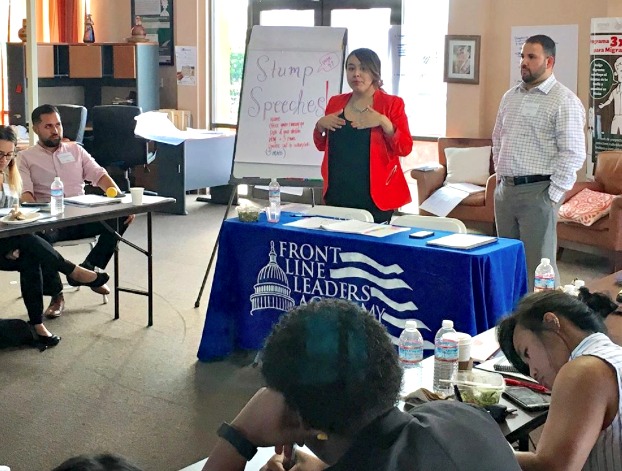During my tenure as a school board member, I have encountered the misconception and honestly, unfair notion around local office serving as a “stepping stone” to something bigger. My hope is that I can deconstruct people’s assumptions around our work in order to recruit and inspire rising leaders who may be turned off by this overly-political concept to take the risk and lead from the heart without feeling pressured to view this as “simply the start.”
First and foremost, it will probably make more sense to share that I by no means am interested in seeking higher office. Yes, colleagues and even some of my own mentors have questioned whether this lack of interest in pursuing higher office is limiting my own potential impact, but the truth is my ambitions are no one’s business but my own and I can be transformational as long as I keep my actions aligned with my values. Yet, for the purpose of allowing people to understand why I am so bothered by the questions around “what’s next” as I reach the dreaded re-election period, I want to share why this is a bigger problem than my own lack of interest in being a career politician.
I didn’t run for school board thinking about what was next. I ran for school board because I was idealistic, and I felt that I had knowledge and passion for education that could be instrumental in transforming the educational system. As a student, I was taught the value of community and how important it was to not forget that I was standing on the shoulders of giants. I found myself searching for a way to come back and do more for Lynwood because I wanted all students to have access to options — options that would facilitate their own pursuit of happiness.
After four years of serving on the board, I still have the same goals. I want to continue doing my part to help shape the vision of our district and to continue creating even more pathways of opportunities for our students. I still stand by the belief that while transforming our education system takes time, the pursuit of justice and educational equity makes the work worthwhile.
So why are school boards important anyway? As a board member, I get to have a direct impact in the lives of our students. I get to have a say about our grading policies. I get to have a say about what our students eat. I get to champion college readiness initiatives that provide our students access to resources that will better prepare them for college and beyond. I get to advocate on behalf of parents and ensure that we are creative in the way we engage them. I get to serve our most vulnerable students and families and help pass resolutions to protect them. I get to look out for the well-being of all employees. I get to be the voice for those at the center of all that we do: our students. And while the list can go on, what really matters is just how important a school board is to a community. There is a lot of power with local control but with power comes great responsibility, which requires the right people at the table.
Unfortunately, it seems like some folks may be so focused on “what’s next” that they neglect to acknowledge just how meaningful the work of school boards actually is. Our students’ futures should not serve as training camps for “higher office.” You know who should run for school board? Those who care about education and believe that ALL STUDENTS deserve a quality education. We don’t need more aspiring career politicians to run and utilize our boards as stepping stones; we need leaders who see this position as an honor and never take for granted the power they have over providing students and their families a better life.
So do me a favor and please stop asking me “what’s next?” because I am damn proud of where I am now. I like knowing that I have a direct impact in the lives of our students and if you don’t think that’s enough, then I challenge you to deconstruct your conclusions around the work of school boards and their role within our system. Perhaps by unpacking how you have arrived at the conclusion that school boards are simply stepping stones, you’ll be able to take the “truth” out of that assumption and help dismantle the idea that serving the local community is simply an entry point.
Alma Renteria
Latest posts by Alma Renteria (see all)
- Rincón Universitario: Cómo Escribir una Narrativa Auténtica para Solicitudes de Universidades, Parte 3 - October 17, 2019
- College Corner: How To Write An Authentic Narrative for College Applications, Part 3 - October 15, 2019
- Rincón Universitario: Cómo Escribir Una Narrativa Auténtica para Solicitudes Universitarias, Parte 2 - October 1, 2019
- College Corner: How To Write An Authentic Narrative for College Applications, Part 2 - September 26, 2019
- College Corner: Cómo Escribir un Relato Auténtico de Solicitudes para la Universidad, Parte 1 - September 4, 2019


Valerie Amezcua
Alma, thank you for your post. I am a school board menbert at SAUSD and I am proud to serve. I regularly get asked to run for higher office and what are my next plans, but I have to say…..i am honored to serve as a school board member. I have no plans other than to run for another term.
I am dedicated to making our schools a better place. It was great to read your post and know there are others who feel the same.
Thank you for all you do
Valerie Amezcua
Vice President
SAUSD TRUSTEE
714-673-0496
[email protected]